Britain left the bloc on January 31, but not everyone in the UK has given up on EU membership. Despite Prime Minister Boris Johnson repeatedly rejecting her independence calls, Scottish First Minister Nicola Sturgeon is still determined to hold a second referendum. The SNP leader believes Scots are being “dragged” out of the bloc against their will.
However, while Brexit might have made the case for Scottish independence stronger, it has also made it practically more difficult.
An independent Scotland would now border a non-EU country, likely requiring infrastructure and border checks between regions whose communities are deeply intertwined – similar to the problem of the Irish border that severely complicated Brexit talks.
Scotland could also be rejected by Brussels due to its current deficit of seven percent of GDP, unless it adopted a strict austerity programme from the EU as well as potentially adopting the euro.
Moreover, new members can only be allowed into the bloc through a unanimous vote from the existing member states – and Holyrood would undoubtedly ruffle feathers if it were to join.
In an exclusive interview with Express.co.uk, Ronald MacDonald, research professor of macroeconomics and international finance at Glasgow University’s Adam Smith Business School, shed light on all the huge difficulties Scotland would face if it applied for EU membership.
He said: “Scotland is a country with a very high level of economic development compared to some other countries that have become independent in the post-war period.
“This means it has these huge financial trade links across the UK, which will be incredibly difficult to unravel.
“If you have a separate currency, it will make it even harder to unravel these assets and liabilities.
JUST IN: Labour insider exposes Starmer’s real Brexit test
“They could get the deficit down, but then we come back to that issue that you really need a deficit of about 3 percent of GDP to be consistent with the EU’s rules.
“They generally like a debt ratio of 60 percent.
“Well, it doesn’t look like we would have that.”
Mr MacDonald noted that the real big issue, though, concerns Scotland joining the euro while its biggest trading partner is the rest of the UK.
He continued: “This creates a huge dichotomy.
“You are no longer in a currency with the rest of the UK. How is that gonna affect trade?”







